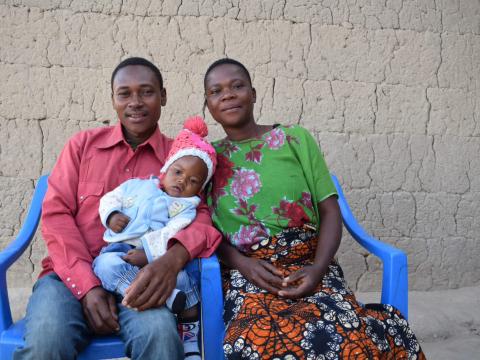Exclusive breastfeeding is everyone’s responsibility

It is a beautiful day in central Tanzania’s Msisi village and farmers are working in their fields preparing for the next farming season.
A narrow path opens up to a neat compound that is surrounded by pigeon peas and mighty baobab trees. Dressed in a colourful African print and carrying her baby on her back, Zena Benedict, 38, is seen sweeping her already neat compound while humming to a beautiful African tune with a wide smile on her face.
Zena is married to Obedi Njemeti, 42, They have four children who are ages 16, 12, seven and nine months. Zena and Obedi are farmers and entrepreneurs in Msisi village who have been impacted by the Irish Aid-funded AIM Health Plus project that provides mother and child health and nutrition training.
“I used to give porridge to my children when they were five months old because I thought the milk I produced was not enough for them,” says Zena, cracking a side smile. Zena continues to explain how this was a norm in her community where women would start feeding their babies porridge and other foods to supplement their milk. This led to poor health among her children, who were often sick. She remembers when her son Stephan was 1-year-old and fell sick constantly, which led to his stunted growth and his skin being covered with rashes. “I was scared of losing my son and kept praying that his health would improve,” says Zena, while looking at her son Stephano sitting next to her.
Many women and men in Msisi community and neighbouring villages did not have exclusive breastfeeding knowledge or knowledge of maternal and child health in general. As a result, children suffered from malnutrition and diarrhoea which led to high rates of child stunting as many children were underweight.
Many mothers did not attend their prenatal clinic visits as required. As if this were not enough, most men did not offer support to their wives during this period; they did not go with their wives to their prenatal visits or help nursing mothers with house chores, “I thought that was a woman’s responsibility and nothing to do with me,” says Obedi while soothing his youngest son, Clarity, to sleep.
In Tanzania, World Vision, through the AIM Health Plus project, worked with the community and trained community health workers to form groups that were trained on mother and child health, the importance of exclusive breastfeeding, proper nutrition, and home hygiene.
As a result, Zena was able to attend all her prenatal visits during her fourth pregnancy. Obedi was supportive throughout her pregnancy, taking her to the clinic and helping her with household chores before and after the baby was born which ensured Zena had enough time to rest and take care of the baby. She also started a kitchen garden for vegetables and is also rearing chickens, using the eggs to help feed her family.
“I did exclusive six months’ breastfeeding with my son Clarity, who is now nine months old and I have seen a great change in my son’s health and growth,” says Zena. Her children are now healthy and active. She keeps her home clean and prepares her family’s meals in a clean environment, which has greatly reduced diarrhoea in her family. “I have become a teacher in my community, telling my neighbours about the importance of breastfeeding and calling upon men in my community to take part in supporting exclusive breast[feeding], because it is everyone’s responsibility,” says Zena.
According to the 2018 Tanzania National Nutrition Survey, the data from Dodoma region shows rates of child stunting of 37.2%, low birth weight rates of 3.7%, underweight rates of 17.8%,and anaemia rates of 30% among women of childbearing age (15–49). This calls for more efforts working together to improve the nutrition status in Dodoma region, and focusing on supporting exclusive breastfeeding is a key intervention to achieve success toward this goal.
Learn more about the work World Vision is doing around the world to improve the health of children, their families and their communities--including informing and equipping families in appropriate breastfeeding knowledge and skills.